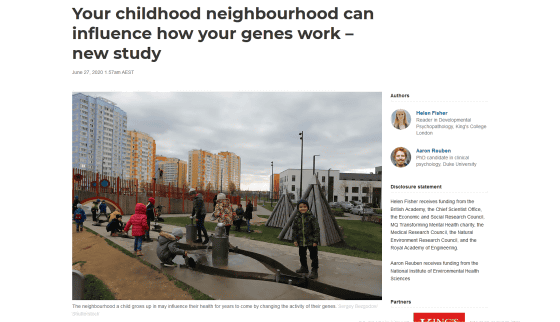Research results that the environment as a child changes the 'function of genes' and affects subsequent life

It has been confirmed by many researchers that the environment of childhood has a great impact on the subsequent life, and children raised in poorer areas compared to those raised in wealthy areas
Association of Neighborhood Disadvantage in Childhood With DNA Methylation in Young Adulthood | Genetics and Genomics | JAMA Network Open | JAMA Network
https://jamanetwork.com/journals/jamanetworkopen/fullarticle/2766579
Your childhood neighborhood can influence how your genes work – new study
https://theconversation.com/your-childhood-neighbourhood-can-influence-how-your-genes-work-new-study-141543

Genes do not cause cells in the body to function simply by being present, but genes are expressed in response to the actions of regulatory factors, and cells make proteins based on the recorded information. It is said that regulating gene expression is an essential process in organisms, and the adaptability of organisms is enhanced by expressing genes when necessary.
The system that controls gene expression is called
Regulation of gene expression is important for organisms, but changes in gene expression do not necessarily have a positive effect on the body. In some cases, genes that are important for growth are turned off, or genes that cause harm to the body are expressed. In addition, recent studies have also suggested that abnormalities in DNA methylation are involved in the development of cancer . Therefore, the research team investigated how the childhood environment affects acquired DNA methylation.

The team analyzed 1619 children born in England and Wales between 1994 and 1995 for DNA methylation data in blood samples taken at age 18. About 50% of the subjects were female, and each subject was born and raised in various socioeconomic conditions in England.
To classify the characteristics of the environment in which the subjects were born and raised, the research team conducted a database of local governments and law enforcement agencies, systematic observation through Google Street View, and a questionnaire survey to other local residents. He also characterized local physical, social, and economic conditions, security, air pollution levels, and the health of residents.
At age 18, when blood samples were taken, most subjects had no cardiovascular disease or type 2 diabetes. Nevertheless, children raised in poorer areas were associated with gene expression associated with the development of chronic inflammation and lung cancer, and exposure to tobacco smoke and air pollution, compared to children raised in blessed areas. Analysis revealed that the DNA methylation of gene expression was active. This trend seems to apply to non-smokers and subjects who do not show high levels of inflammation.
These acquired changes in DNA methylation levels indicate that children born and raised in poorer areas are more likely to have lung cancer, and are more likely to be adversely affected by cigarette smoke and air pollution. The research team suggests that differences in the already expressed genes may lead to future differences in health status even if the health status differences due to the environment in which they were born and raised are not clear at the age of 18. ..

It is unknown whether the difference in DNA methylation seen at age 18 persists or is improved by subsequent life. But the results of this study show that people's genes and the environment in which they are raised are intertwined, affecting the health of people, the research team said.
Related Posts:
in Science, Posted by log1h_ik







